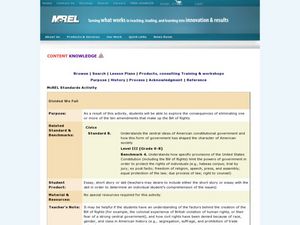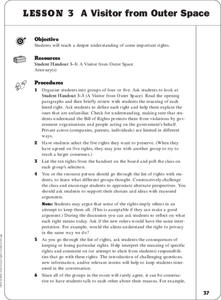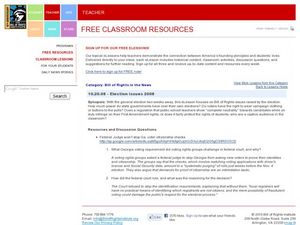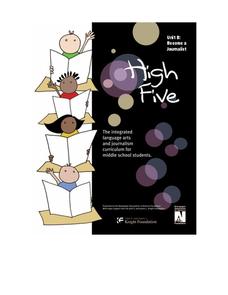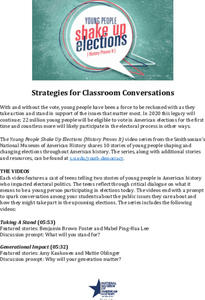Curated OER
Divided We Fall
Middle schoolers investigate the consequences of eliminating one or more of the amendments to the Bill of Rights.
Curated OER
Random Statistics
Seventh and eighth graders solve and complete 20 various types of short answer problems. First, they write a brief description of themselves including those as stated. Then, learners categorize the type of sampling used in various...
Curated OER
The Kid Who Ran for President
In this reading worksheet, young scholars answer 10 multiple-choice questions about the book. For example, "Why did Judd change his parakeet's name?"
Social Media Toolbox
Cyberbullying
What can we do to make our school community more aware of cyberbullying? From The Social Media Toolbox, instructional activity 10 of 16 takes on the tough topic of bullying. Learners research cyberbullying through online research, then...
Curated OER
Lesson 3: A Visitor From Outer Space
Students review provisions of Bill of Rights and First Amendment, choose five rights they would like to preserve, support their choices and ideas with reasoned arguments, and discuss consequences of keeping or losing particular rights.
Curated OER
With Liberty and Justice for All
Fifth graders identify and define in their own words the first ten amendments to the Constitution. They are assigned a CDV or amendment from the Bill of Rights and create and present a one-minute skit demonstrating it.
Curated OER
Judges in the Classroom Lesson Plan History Of The Bill Of Rights
Students study the Bill of Rights and the US Constitution. They investigate the authors of the Bill of Rights and play a game based on the research.
Curated OER
Bill of Rights in the News: Election Issues 2008
Students consider First Amendment rights. In this Bill of Rights lesson, students complete an activity guide regarding constitutional rights issues raised in the 2008 presidential election. Students respond to discussion questions...
Curated OER
We Are the Government
Students read primary documents to find the motivations of the founding fathers of the United States. In this primary documents lesson, students discuss the meaning of the Preamble to the Constitution, read parts of the Constitution...
National Endowment for the Humanities
The Creation of the Bill of Rights: “Retouching the Canvas”
While the Constitutional Convention lay the foundation of the new government for the United States, the protections given under the Bill of Rights were controversial. Using documents, such as James Madison's and Thomas Jefferson's...
Newseum
From the Front Page to the History Books
Young journalists compare news coverage of four major events with how the same events are covered in historical accounts. The ensuing discussion asks class members to compare and contrast the role of a reporter and the role of a historian.
Newseum
Is This Story Share-Worthy?
Young journalists use a "Is This Story Share-Worthy?" flowchart graphic to decide whether a story is worth sharing online. Instructors provide groups with fake news, poor quality stories, opinion pieces, biased news, and high-quality...
Newseum
Free Press Challenges Through History: Analyzing Historical Sources
The debate over the integrity of stories in media is not new. Young journalists analyze historical sources that reveal freedom of the press controversies and draw parallels to challenges freedom of the press faces today.
Online Publications
Become a Journalist
Explore the newspaper as a unique entity with a detailed and extended unit. The unit requires learners to consider the newspaper's role in democracy, think about ethics, practice writing and interviewing, and examine advertising and news...
Curated OER
How was the Constitution Used to Organize the New Government?
How did the United States Congress determine how the new president and vice president would be named when the nation was first established? Who would provide money for the government, and how would the executive branch be organized?
Curated OER
Supreme Court June 2010 Decisions Wrap-Up
Students consider constitutional rights. In this Bill of Rights lesson, students complete an activity guide that requires students to examine Bill of Rights-related cases of 2010. Students respond to discussion questions pertaining to...
Curated OER
No Taxation Without Representation
Students consider colonial rights. In this Bill of Rights lesson, students complete an activity guide that requires students to analyze taxation without representation. Students respond to discussion questions pertaining to taxes imposed...
Teaching Tolerance
Journalism for Justice
Roll the presses! Or at least have your class members participate in the time-honored tradition of the student press by creating their own newspapers or journalist pieces on a social problem. After conducting research and collaborating...
Smithsonian Institution
Young People Shake Up Elections (History Proves It) Educator Guide
Vote, it's your civic duty! The resource provides several videos about voting in the United States. Scholars watch a series of topics ranging from youth participation to civic action. The educator's guide provides teachers with...
Curated OER
Blasphemy! Salman Rushdie and Freedom of Expression
Young scholars explore the concepts of blasphemy, censorship and freedom of expression through the lens of Salman Rushdie. They also consider how these issues have been reflected in US history.
Curated OER
Philanthropic Movements in the United States To 1900: The Bill of Rights
Students translate the meanings of and draw illustrations depicting the Bill of Rights amendments. They discuss how philanthropy is enabled by the Bill of Rights.
Curated OER
It's My Right
Learners participate in activities examining the Bill of Rights. They discover the different articles and Amendments.
Curated OER
Judges in the Classroom
Students study the history of the Bill of Rights and discuss the first ten amendments. The class is put into groups and each group is responsible for knowing 5 statements from the history of the Bill of Rights. Then the class plays a...
Curated OER
Church and State Separation: The Challenge and the Debate
Students describe the basic elements of the U.S. Constitution's First Amendment as it relates to the separation of church and state and freedom of religion.


